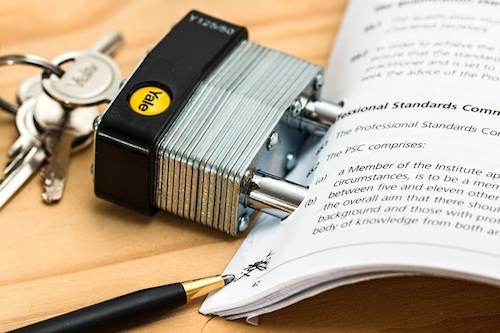
In the state of California, a lease or rental agreement requires a security deposit, in most cases. The security deposit is a lump sum of money paid upfront by tenants prior to them moving into a rental unit.
For a landlord, collecting a security deposit from your tenants offers many benefits. The benefits of security deposits include:
- Help cover for unpaid utilities upon move-out. During the lease period, most - if not all – the utilities will be in the tenant’s name. Should they fail to pay them, the security deposit law entitles the landlord to appropriate deductions.
- Help cover excessive cleaning costs. A rental agreement or lease makes it clear that the tenant must leave the premises in the same condition they found it less some ordinary wear and tear. Sadly, not every tenant does this. If the tenant leaves the rental in extreme case of uncleanliness, landlords have the right to make deductions from their tenants' security deposits.
- Help cover loss in monthly rent payments. Unpaid rent is a breach of the rental contract. It’s probably one of the most common problems experienced by California landlords. Should there be rent owed, part or all of the tenant’s security deposit may be used to cover for a month's rent loss.
- Help cover for lost rental income. Your tenants may simply choose to abandon the rental unit. They may also choose to break their lease agreement early. To recover losses associated with any of these situations, a landlord make deductions.
- To cover excessive damage. You can make deductions for unauthorized paint colors, holes in the walls, chipped countertops and broken or chipped tiles.
In this post, Pinnacle Property Management is going over everything you need to know about security deposits.
Here’s a Guide to the California Security Deposit Law
1. California Security Deposit Limit
Most states limit how much a landlord can charge a tenant for a security deposit. The maximum security deposit limit depends on whether the said residence is furnished or not.
When you lease a furnished residential property, the limit for security deposits in California is capped at a maximum of three month’s rent. The limit is capped at a maximum of two months’ rent when the unit is an unfurnished residential property.
In addition, if the tenant has a waterbed, the laws permit landlords to charge an extra 50% of the rent.

2. Nonrefundable Fees
By definition, all security deposits are refundable. However, some states allow landlords to charge non-refundable security deposits as well. An example of a nonrefundable fee could be a fee for having a pet in the unit.
So, does the state allow non-refundable fees? No, it doesn’t. All deposits are refundable to tenants at the end of their lease term.
3. Storing a Tenant's Deposit in California
Some states may have rules regarding how landlords should keep a tenant’s deposit. For example, in Florida, a landlord may choose to post a surety bond for the amount of the deposit. A landlord may also choose to keep it in either an interest or non-interest-yielding account.
However, Under State law, there are no specific rules that landlords must heed to when storing a tenant’s security deposit.
4. Notice After Full Security Deposit Receipt
Under California law, landlords are not required to write a proper notice to a tenant regarding receipt of their deposit.

5. Reasons to Withhold a Tenant’s Security Deposit in California
Under certain conditions, a landlord may keep all or a portion of a tenant’s deposit. In the state of California, common reasons include:
- To return personal items or replace damaged or lost furniture
- To make repairs
- For the purposes of cleaning the unit
- To compensate for unpaid rent
Although, in accordance with California’s tenants’ rights concerning security deposit the landlord cannot keep it to cover conditions that existed before the tenant moved into the unit. Standard wear and tear should not be included in reasons make deductions.
Examples of ordinary wear and tear include:
- Fading paint from sunlight
- Cracks in the walls caused by settling
- Scratches and light watermarks
- Dirty grout surrounding the tiles
6. A Walk-Through Inspection
A walk-through inspection is required under California landlord-tenant law. The inspection helps to check the property's condition. Prior to conducting the inspection, California landlords must give the tenant 48 hours' written notice. Then, the inspection can be done.

7. Security Deposit Refund in California
The California security deposit laws state that once the tenant vacates, landlords have 21 days to give all or part of it back to the tenant. If there are any deductions, the rental property owner or landlord must provide an itemized statement of deductions alongside returning security deposits.
8. Change in Ownership
Under California law, if the landlord sells the unit, the former landlord has two options:
One is to return the remaining amount, minus deductions back to the tenant. Then, he or she must notify the incoming landlord of the same.
And two, to transfer the deposit to the new owner. The outgoing landlord must then notify the tenant in writing of the same. In addition, the written notice must state the name and contact address of the new owner.
Bottom Line: Security Deposit Laws in California
There you have it. A guide to the security deposit laws in California, including how to make deductions and prevent security deposit disputes.
A California landlord can charge a security deposit and collect the money from their tenants. However, when handling the California security deposit, be sure to follow all the state laws. This will ensure you avoid lawsuits or being sued by your tenant in a small claims court.
Remember, a landlord makes deductions from the California security deposit if there are rental damages caused by the tenants that are beyond normal wear and tear, or the tenant has failed to pay rent. But, they cannot make deductions for normal wear and tear.
Need more help? If so, please contact a qualified California landlord-tenant attorney. Alternatively, contact Pinnacle Property Management! We can help a landlord and tenant with any needs they may have.
Disclaimer: This blog about security deposit laws and deductions in California is in no way a substitute for professional legal advice. Also, keep changing and it may not be up to date at the time of your reading. If you still have questions about how to deduct from a deposit or want further help, please contact us.







